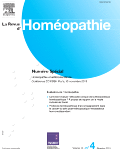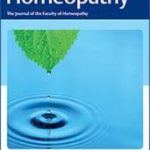Francesco Macrì
Homeopathy and Antibiotic Resistance
Rev Homeo, 2019, 10 (4), e37-e39

Antibiotic resistance (AR) has long been a problem for doctors and healthcare organizations worldwide. In recent years the issue has become even more pressing: the Global Antimicrobial Surveillance System (GLASS), launched by the World Health Organization in October 2015, bears witness to the growing emergence of antibiotic-resistant microorganisms. In Italy, AR levels are still among the highest in Europe. This is presumably due to over-use of antibiotics. According to the recent Italian National Surveillance Report on bacteriemia, the incidence of AR is on average, for the most widespread bacteria, 25-30%. The causes of the development of AR are complex, but undoubtedly include the excessive and inappropriate use of antibiotics then each strategy to correct these misconducts will be effective. Complementary and alternative medicine (CAM) offers a conceptual alternative to the use of conventional treatments, but in recent years a different model, that of integrated medicine (IM), has been gaining ground. Several studies show that CAM can allow to reduce the recourse to antibiotics in the treatment of respiratory symptoms, without increasing the incidence of complications. A recent study conducted by our Italian Paediatric Society’s CAM research group investigated the efficacy of homeopathy in the treatment of acute otitis in children. Ninety children were enrolled and randomized to a homeopathy treatment group or to a control group, each of 45 patients. Antibiotics were prescribed in 33.3% of children in the treatment group and 62.2% of children in the control group (p = 0.006). In conclusion, there is evidence in the literature demonstrating that the use of CAM in general, and homeopathy in particular, can reduce recourse to antibiotics, with positive repercussions for strategies to combat antibiotic resistance.






Lascia un commento
Devi essere connesso per inviare un commento.